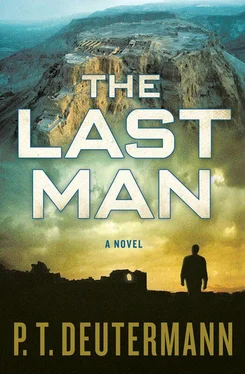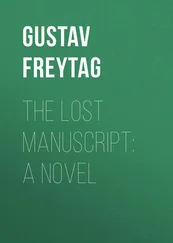He peered back over the ridge and could see Judith’s window still lighted, but she was not in view. There were five other rooms with lights on the second floor, and three on the ground floor, but otherwise the building was dark. The observation box under the cable-car tower was also fully dark, but that didn’t mean it wasn’t manned. He waited for fifteen minutes, watching the box for the telltale signs of a cigarette, but there was nothing. There were still no army trucks in the parking lot, either. The flicker of light on the palm trees from the kids’ bonfire was the only movement around the hostel building. He decided to go for it and, crouching behind the sand ridge, began the hike up the southern ravine.
* * *
Judith put down her pen and rubbed her eyes. It was close to ten o’clock. She realized that she had been listening to the German kids singing out front instead of concentrating on her work, which was a sure sign that it was time to quit. She wasn’t really all that sleepy, but she really hadn’t been concentrating for the past half hour. Besides the distraction of the voices and guitar music out front, she couldn’t shake the building apprehension about going back to the university to face the chairman and his questions.
She decided to go downstairs and perhaps sit out on the front steps of the hostel for a while. Get some fresh air and enjoy a little human contact. She smiled to herself as she reached for a sweater. Between her sojourns on the desolate beach with David Hall and talking to random tourists, security detail soldiers, and the kids staying at the hostel, she had had more social interaction in these few days than she had normally in a year at the university. She had almost forgotten the diversity of the human race, dealing as she did with the same small coterie of professional academics day in and day out. She stopped by the bathroom and then went out the hostel lobby corridor to the front steps.
The kids were arranged in comfortable-looking clumps on blankets around a small bonfire. Two girls were strumming guitar, and another was playing a harmonica. Judith thought she saw some wine bottles being passed around and wondered where they had obtained wine at this desolate spot. They’re students, she remembered; silly question.
She sat in the shadows of the front steps for nearly an hour, her mind a blank screen across which images of times past flowed: growing up in Haifa, her own time at university, her days with Dov… and nights. Don’t forget the nights. What was it her next-door neighbor, a widow of the Yom Kippur War, had said: You never know, when they go out the door in the morning; you just assume they’ll be back at dark. David Hall, the American, was right, she mused. Going through the motions is no life at all. Leave it to an American to come right out and say it.
She considered going back inside and down the hall to his door, to see if he might want to join her out here, but then dismissed the idea. He would think her much too forward. Besides, while he was obviously attracted to her, he seemed at the same time to be holding back. Attracted and interested were two different things. Yes, but to be interested there has to be at least an indication of a two-way street. She wasn’t sure she knew how to manage that anymore.
The night air was cool and soft, and the bonfire, though subdued, warmed the night with its timeless, comforting light. She did not want to look up at the mountain, looming in the darkness over her left shoulder. Up there everything was dead. Down here there was life. She contented herself with just sitting there, if only on the edges of it.
* * *
It took David just under two hours to reach the western gate. Buoyed by a growing excitement, he had climbed steadily, passing now familiar landmarks along the way, waiting a few minutes at the top of the southern ravine to see if there were any patrols stirring but then pressing ahead. He had stopped again before ascending the ramp, just to make sure no one was advancing up the ravine or across the plateau of the Roman camp. There was only the night breeze, and the black shadow of bloody King Herod’s haunted mountain looming before him.
He went up the ramp, crossed through the northern precincts of the western palace, and stood in a ruined archway for a moment, recovering his breath and looking down across the starlit stone slope. The battered white walls, scattered in haphazard clumps around the plateau, lay like bones in the starlight. Two thousand years ago. The Vision of the Dry Bones. He shook his head at the enormity of it and then walked down the slope to the eastern gate, where he dismounted the pack near the pile of scaffolding pipes and checked his gear. He wanted to switch on the flashlight, but once out that gate, even a small light could be seen for miles. So he switched off the Maglite, and it was darken ship until he was inside that rim-wall cistern. He walked over to the supposed olive grove site next to the Byzantine structures and found the historical marker sign, which he grabbed and worked out of the hard ground. One makeshift shovel, he thought, holding the sign in both hands. All he had to do was move some sand.
He retrieved his pack, went through the gate, and carefully made his way across the top of the Serpent Path to the cistern entrance. He could not resist sticking his face around the corner of the shoulder of rock that protruded just enough to hide him from the observation post. Far below was the tourist center, its empty parking lots looking like ponds, but there was no sign of the campfire in the picnic grove. Good. Party’s over; the entire place should be asleep by now.
He scrunched his way through the loose sand to the cistern entrance hole, passed the pack and the sign in, and then climbed through himself. The faint stink of ammonia lingered in the air. He flicked on the Maglite and scanned the ceiling and the upper walls of the cistern for bats, but there were still no other visible creatures in the cave. He hoped there were no desert adders lurking just under the sand.
The small depression he had dug was still there, with his tracks all around it. He set the light flat on his pack and, using the sign, began to shovel away the sand from the low point of the cistern. At first it was easy, but then the sand became progressively wetter and more difficult to move. After fifteen minutes he had cleared an area four feet square, down to a depth of nearly two feet. The reek of ammonia was very strong now, and even with a handkerchief tied across his nose and mouth, he had to step away every few minutes to get some fresh air near the entrance hole. After another fifteen minutes he had dug past the layer of bat guano, and the atmosphere cleared considerably. The sand was really wet, almost saturated. He stopped when his improvised shovel hit something hard.
Reaching into the hole, he pushed the wet sand aside and uncovered what looked like a flat rock or paving stone. He ran his fingertips over it and was thrilled to see that it was artificially smooth, not like the wind- and sand-blasted rock walls of the fortress above. Man-made, he thought. Smooth — and wet. Vestiges of the last rainfall here, he thought. Probably back last winter. The almost constant temperature in the cave would slow evaporation, especially once the water level subsided into the sand. He cleared away more of the stone, looking for an edge. He found something better than that. Two feet to the right side of the hole he encountered a depression in the stone, into which had been fixed an iron ring about three inches in diameter. The ring was rusty and did not lift under his prying fingers, but there would be only one purpose to such a ring: to lift the stone.
By God, he’d found it! He experienced a strong yearning to have Adrian with him.
Читать дальше












